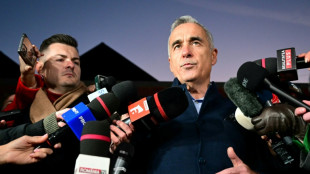
-
 Yen rallies, euro up on rising inflation data
Yen rallies, euro up on rising inflation data
-
Attack-minded Spurs boss Postecoglou says: 'You'll miss me when I'm gone'

-
 Syria jihadists, allies shell major city Aleppo in shock offensive
Syria jihadists, allies shell major city Aleppo in shock offensive
-
Macron inspects 'sublime' Notre Dame after reconstruction

-
 Arsenal must be near-perfect to catch Liverpool, says Arteta
Arsenal must be near-perfect to catch Liverpool, says Arteta
-
Arrests, intimidation stoke fear in Pakistan's politics

-
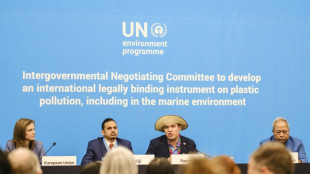 Showdown looms on plastic treaty days before deadline
Showdown looms on plastic treaty days before deadline
-
Ngozi Okonjo-Iweala: the WTO's trailblazing motivator
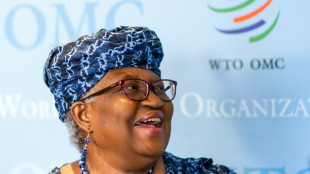
-
 WTO chief reappointed as Trump threat looms
WTO chief reappointed as Trump threat looms
-
US landmine offer to Ukraine throws treaty into 'crisis': campaign group

-
 British MPs debate contentious assisted dying law
British MPs debate contentious assisted dying law
-
Macron offers first glimpse of post-fire Notre Dame

-
 Syria jihadists, allies shell Aleppo in shock offensive
Syria jihadists, allies shell Aleppo in shock offensive
-
Japan government approves $92 bn extra budget

-
 Toll in Syria jihadist-army fighting rises to 242: monitor
Toll in Syria jihadist-army fighting rises to 242: monitor
-
UK transport secretary quits in setback for Starmer

-
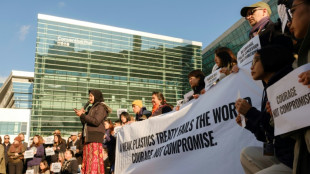 Days before deadline, plastic treaty draft highlights disagreement
Days before deadline, plastic treaty draft highlights disagreement
-
Crypto boss eats banana art he bought for $6.2 million

-
 Teen news boss criticises Australian social media ban
Teen news boss criticises Australian social media ban
-
Taiwan detects 41 Chinese military aircraft, ships ahead of Lai US stopover

-
 Spain urged to 'build differently' after deadly floods
Spain urged to 'build differently' after deadly floods
-
WTO chief faces heavy task as Trump threat looms

-
 Herbert takes control at Australian Open as Smith tanks
Herbert takes control at Australian Open as Smith tanks
-
Israel PM again warns Iran after top diplomat talks of revising nuclear doctrine

-
 Brilliant Brook's 132 puts England on top against sloppy New Zealand
Brilliant Brook's 132 puts England on top against sloppy New Zealand
-
Brilliant Brook's 132 puts England on top against New Zealand

-
 US landmine offer to Ukraine throws global treaty into 'crisis': campaign group
US landmine offer to Ukraine throws global treaty into 'crisis': campaign group
-
Singapore hangs 4th person in three weeks

-
 Five things to know about NewJeans' shock split from agency
Five things to know about NewJeans' shock split from agency
-
Waste pickers battle for recognition at plastic treaty talks

-
 Ireland votes in closely fought general election
Ireland votes in closely fought general election
-
Top UN court to open unprecedented climate hearings
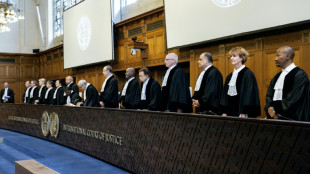
-
 European countries that allow assisted dying
European countries that allow assisted dying
-
British MPs to debate contentious assisted dying law

-
 Schmidt not expecting hero's welcome on Ireland return
Schmidt not expecting hero's welcome on Ireland return
-
PSG stuck between domestic dominance and Champions League woes

-
 'Hot fight' as unbeaten Bayern visit Dortmund fortress
'Hot fight' as unbeaten Bayern visit Dortmund fortress
-
Bordeaux-Begles' Samu 'not finished yet' with Wallabies

-
 Brook and Pope half-centuries haul England to 174-4 against NZ
Brook and Pope half-centuries haul England to 174-4 against NZ
-
Yen rallies on rate hike bets as equity markets swing

-
 Ukraine superstar Mahuchikh brings 'good vibes' to her war-torn country
Ukraine superstar Mahuchikh brings 'good vibes' to her war-torn country
-
PlayStation at 30: How Sony's grey box conquered gaming

-
 Saudi Arabia hosts UN talks on drought, desertification
Saudi Arabia hosts UN talks on drought, desertification
-
PlayStation: Fun facts to know as Sony's console turns 30

-
 Nepal's first transgender candidates run for local office
Nepal's first transgender candidates run for local office
-
Father of PlayStation says 'everyone told us we would fail'

-
 Ireland seek to overcome former coach Schmidt's Wallabies
Ireland seek to overcome former coach Schmidt's Wallabies
-
Detroit survive Bears comeback to make it 10 wins in a row

-
 Mexican actor Silvia Pinal dead at 93
Mexican actor Silvia Pinal dead at 93
-
'Black Friday' deals target inflation-weary US consumers


Oscar hopeful 'Argentina, 1985' offers lessons on democracy: prosecutor
Luis Moreno Ocampo was just 32 years old and had no trial experience when he was summoned to prosecute Argentina's generals in 1985 after a disastrous military dictatorship -- a story retold in an Oscar-nominated film.
Moreno Ocampo, who went on to become the first prosecutor of the International Criminal Court, says "Argentina, 1985" can help teach global audiences about the risks of losing democracy -- and the importance of public opinion.
"You've got to win your case in court. But then it's a battle for the memory," the 70-year-old Ocampo told AFP in an interview in Malibu, California, where he currently lives.
"I won the battle... in 1985. But (with this movie), Santiago Mitre and Ricardo Darin are winning the battle for memory in 2023, and that's unique."
Mitre is the director of "Argentina, 1985," one of five nominees for the Academy Award for best international feature.
It tells the story of one of the most important trials in the country's history, and puts the focus on the tensions as the Latin American nation groped its way back to democracy after seven years of murderous military government from 1976 to 1983.
Moreno Ocampo (Peter Lanzani), who himself hailed from a traditional military family, is appointed by lead prosecutor Julio Strassera (Darin) to help try nine of the uniformed men who had ordered thousands of killings and disappearances.
The trial led to the convictions of six men including former dictator Jorge Videla and key junta member Emilio Massera, who were jailed for life.
The proceedings, compared to the Nuremberg trials after World War II, also sharply divided Argentines -- and even Moreno Ocampo's own family.
"The movie shows how my mother was against me," said Moreno Ocampo, who is now a visiting professor at the University of Southern California and a senior fellow at Harvard.
"My mother went to church with the dictator general Videla!"
But as one of the film's most painful scenes reveals, the harrowing first testimony of the trial -- that of a woman who is forced by her captors to give birth handcuffed in the back seat of a patrol car -- changed her mind.
"The next day she called me... She told me: 'I still love General Videla, but you are right, he has to go to jail'."
- Torture -
"Argentina, 1985" shows how the military regime set up detention, torture and extermination camps, with people being thrown alive into the sea from airplanes, shot or detained indefinitely.
Some 30,000 Argentines disappeared, and it is estimated that hundreds of babies born in captivity were given to other families, including military families.
Moreno Ocampo says holding those responsible to account is vital if a country is to come to terms with its past and become a stable and secure democracy -- something he says Brazil, for example, did not do.
"They did not investigate the past... this has an impact. In Brazil, they feared that the military could get involved in a coup in the near future," he explained.
"The problem is not the military, because they follow orders. It's the elites -- if your elites support a coup, you have a problem," he says.
"It's something that Brazil, and even the United States, hasn't understood," he adds, referring to the 2021 assault on the US Capitol in the waning days of Donald Trump's presidency.
"When journalists ask me how to avoid coups d'etat... the issues are not those involved in the sedition, the issue is who was supporting them," he told AFP.
"The elite supporting civilian sedition, like in Washington -- they are the problem."
- 'Power of youth' -
Argentina has won two Oscars previously, both for films that tackled the years of military terror: "The Official Story" in 1986 and "The Secret in Their Eyes" in 2010.
Moreno Ocampo -- who will attend the Oscars on Sunday -- says he hopes that this year's offering, with its focus on the role young people played in achieving justice, will bring the four-decade-old story of Argentina's emergence from dictatorship to a new audience.
"My 23-year-old son didn't know what had happened. Now he's learning," he said.
"This film is about the risk of (losing) democracy. But it's also about the power of youth -- how young people are the ones who change the world and how you have to continue to battle for justice.
"Justice is a never-ending job."
W.Lapointe--BTB


